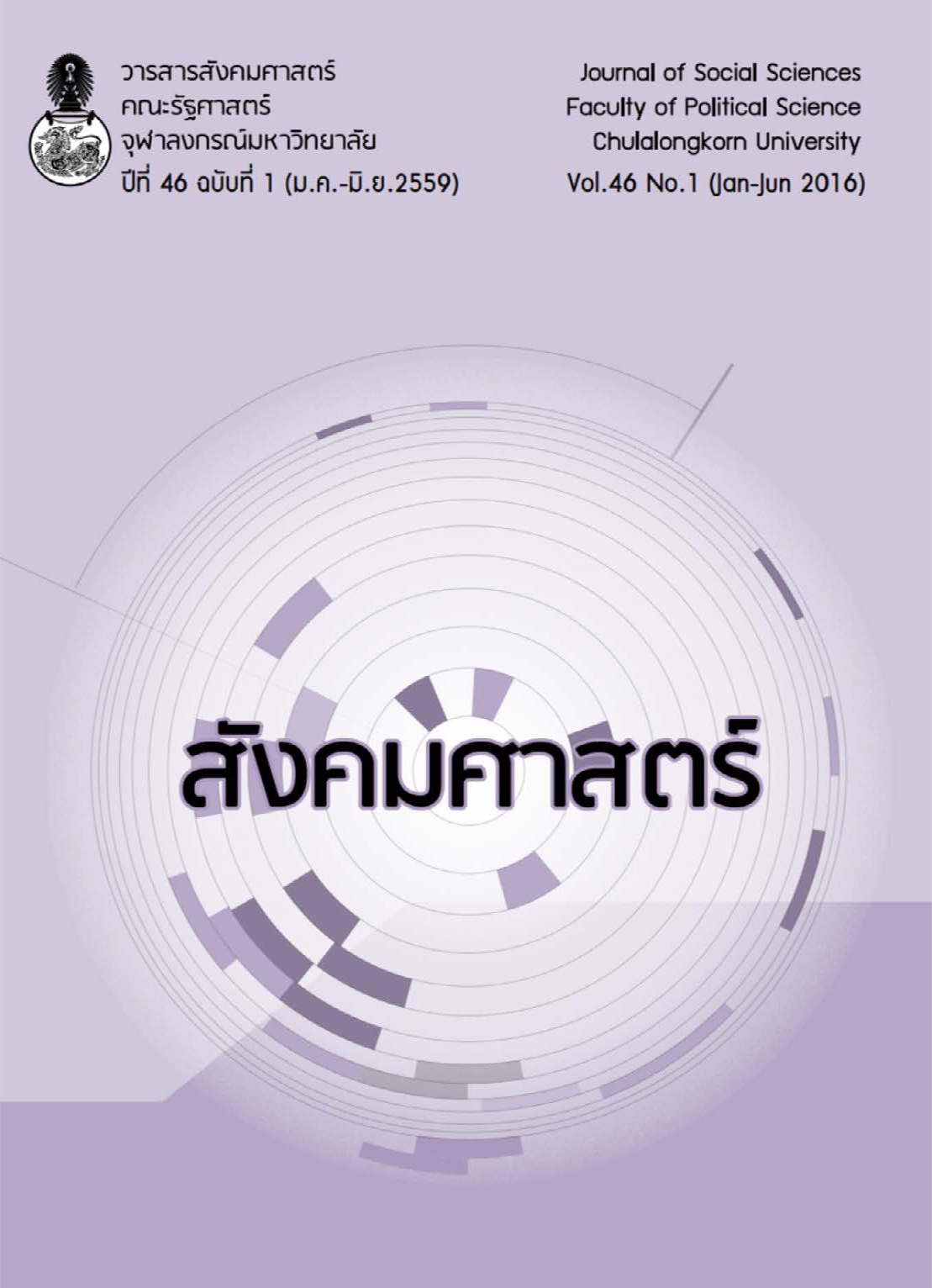ทำไมจึงไม่ค่อยมีทฤษฎีเศรษฐกิจการเมืองจากฐานองค์ความรู้ทางวิชาการในโลกที่สาม?” : การครอบงำและการเลือกปฏิบัติทางวิชาการจากความรู้แบบสำนักยุโรปเป็นศูนย์กลาง
DOI:
https://doi.org/10.61462/cujss.v46i1.1157คำสำคัญ:
ประวัติศาสตร์นิพนธ์ว่าด้วยระเบียบการศึกษา, สำนักยุโรปเป็นศูนย์กลาง, ฐานของเศรษฐกิจการเมืองนอกสำนักยุโรป, การครอบครองอำนาจนำ, การเหยียดชนชั้นทางวิชาการบทคัดย่อ
บทความนี้เริ่มต้นจากการตอบคำถามที่ว่า “ทำไมจึงไม่ค่อยมีทฤษฎีเศรษฐกิจการเมืองจากฐานองค์ความรู้ทางวิชาการในโลกที่สาม” โดยข้อถกเถียงหลักในการตอบคำถามใช้กรอบการศึกษาแบบประวัติศาสตร์นิพนธ์ว่าด้วยระเบียบการศึกษา เพื่ออธิบายว่าองค์ความรู้ทางเศรษฐกิจการเมืองในฐานะ “ทฤษฎี” ถูกครอบงำโดยกลุ่มสำนักยุโรปเป็นศูนย์กลางตั้งแต่ช่วงศตวรรษที่ 18 ถึง 19 ทั้งในด้านของทฤษฎีฝั่งเสรีนิยมและมาร์กซิสต์ ต่างมีชุดคำอธิบายจากยุโรปเป็นศูนย์กลางและอ้างว่าคำอธิบายดังกล่าวมีความเป็นสากล ทั้งในระดับความเป็นศาสตร์ด้วยวิธีวิทยาต่างๆแบบเสรีนิยม และแบบแผนการพัฒนาการทางประวัติศาสตร์แบบมาร์กซิสต์ จึงนำมาสู่การการเลือกปฏิบัติและการเหยียดชนชั้นทางวิชาการต่อฐานองค์ความรู้ทางเศรษฐกิจการเมืองนอกสำนักยุโรป ทั้งขอบเขตการศึกษา ทรัพยากรทางวิชาการ และการลดทอนคุณค่าของการศึกษานอกพื้นที่ยุโรปให้เป็นเพียงอาณาบริเวณศึกษา อย่างไรก็ดี การศึกษาเศรษฐกิจการเมืองบนฐานนอกสำนักยุโรปในกลุ่ม “การเมืองชีวิตประจำวัน” ได้ขึ้นมาท้าทายองค์ความรู้ที่ครอบครอบอำนาจนำในทางทฤษฎีได้
Downloads
เอกสารอ้างอิง
Acharya, Amitav, and Barry Buzan. 2007. Why is there no non-Western international relations theory?:An introduction. International Relations of the Asia-Pacifif ic 7(3): 287-312.
Al-Ghazali, Muhammad. 2008. The secularist modernist bias of Western social sciences. Islam and Science 6(1): 73-89.
Bates, Robert H. 1997. Area studies and the discipline: A useful controversy?” Political Science and Politics 30(2): 166-169.
-----. 1996. Letter from the president: Area studies and the discipline. Newsletter of the APSA Organized Section in Comparative Politics 7(1): 1-2.
Bilgin, Pinar. 2008. Thinking past ‘Western’ IR? Third World Quarterly 29(1): 5-23.
Caves, Richard E. 1976. Economic models of political choice: Canada’s tariff structure. The Canadian Journal of Economics 9(2): 278-300.
Chen, Ching-Chang. 2011. The absence of non-Western IR theory in Asia reconsidered. International Relations of the Asia-Pacifif ic 11(1): 1-23.
Cohen, Benjamin J. 2007. The transatlantic divide: Why are American and British IPE so different?. Review of International Political Economy 14(2): 197-219.
Cox, Robert W. 1996. Gramsci, hegemony, and international relations: An essay in method. In Approach to world order, eds. Robert W. Cox, and Timothy J. Sinclair, 124-143. Cambridge: Cambridge University Press.
-----. 1986. Social forces, states and world orders: Beyond international relation theory. In Neoliberalism and its critics, ed. Robert O. Keohane, 204-254. New York: Columbia University Press.
Flyvbjerg, Bent. 2001. Making social science matter: Why social inquiry fails and how it can succeed again. Cambridge: Cambridge University Press.
Frank, Andre Gunder. 1967. Capitalism and underdevelopment in Latin America: Historical studies of Chile and Brazil. New York: Monthly Review Press.
Gunaratne, Shelton A. 2009. Globalization: A non-Western perspective: The bias of social science/communication oligopoly. Communication, Culture & Critique 2(1): 60-82.
Graham, Loren, and Jean-Michel Kantor. 2007. Soft’ area studies versus hard social science: A false opposition. Slavic Review 66(1): 1-19.
Hobson, John M. 2006. Civilizing the global economy: Racism and the continuity of Anglo-Saxon Imperialism. In Global standards of market civilization, eds. Brett Bowden, and Leonard Seabrooke, 60-76. New York: Routledge.
-----. 2004. The Eastern origins of Western civilization. Cambridge: Cambridge University Press.
-----. 2012. The Eurocentric conception of world politics: Western international theory. Cambridge: Cambridge University Press.
-----. 2013a. Part 1 – Revealing the Eurocentric Foundation of IPE: A critical historiography of the discipline from the classical to the modern era. Review of International Political Economy 20(5): 1024-1054.
-----. 2013b. Part 2 – Reconstructing the non-Eurocentric Foundation of IPE: From Eurocentric ‘Open economy politics’ to inter-civilizational political economy. Review of International Political Economy 20(5): 1055-1081.
Hobson, John M., and Leonard Seabrooke, eds. 2007. Everyday politics of the world economy. Cambridge: Cambridge University Press.
Horkheimer, Max. 1982. Critical theory: Selected essays. Matthew J. O’Conell, et al., trans. New York: Continuum.
Huntington, Samuel P. 1996. The clash of civilization and the remaking of world order. New York: Simon & Schuster.
Inglehart, Ronald, and Christian Welzel. 2005. Modernization, cultural change, and democracy: The human development sequence. Cambridge: Cambridge University Press.
Kindleberger, Charles P. 1970. Power and money: The politics of international economics and the economics of international politics. New York: Basic Books.
Laitin, David D. 2003. The Perestroikan challenge to social science. Politics and Society 31(1): 163-184.
Lipset, Seymour Martin. 1959. Some social requisites of democracy: Economic development and political legitimacy. The American Political Science Review 53(1): 69-105.
Perestroika. 2000. On the irrelevance of APSA and APSR to the study of Political Science. https://archive.org/ stream/OnTheIrrelevanceOfApsaAndApsrToTheStudy OfPoliticalScience/mrperestroika_djvu.txt (Accessed on November 15, 2015).
Rueschemeyer, Dietrich, Eveline Huber Stephens, and John D. Stephens. 1992. Capitalist development and democracy. Chicago: University of Chicago Press.
Scott, James C. 1985. Weapons of the weak: Everyday forms of peasant resistance. New Haven and London: Tale University Press.
Steinmo, Sven. 2005. The emperor had no clothes: The politics of taking back the APSR. In Perestroika! The Raucous Rebellion in political science, ed. Kristen Renwick Monroe, 294-303. New Haven: Yale University.
Stewart, Sharla A. 2003. Revolution from within. University of Chicago Magazine 95(5). http://magazine.uchicago.edu/0306/features/index-print.shtml (Accessed on November 10, 2015).
Thomas, Peter D. 2009. The Gramscian moment philosophy, hegemony and Marxism. Leiden: Brill.
Tullock, Gordon. 1967. The welfare costs of tariffs, monopolies and theft. Western Economic Journal 5(3): 224-232
ดาวน์โหลด
เผยแพร่แล้ว
รูปแบบการอ้างอิง
ฉบับ
ประเภทบทความ
สัญญาอนุญาต
ลิขสิทธิ์ (c) 2016 คณะรัฐศาสตร์ จุฬาลงกรณ์มหาวิทยาลัย

อนุญาตภายใต้เงื่อนไข Creative Commons Attribution-NonCommercial-NoDerivatives 4.0 International License.
เงื่อนไขการอนุญาตสาธารณะ
นโยบายลิขสิทธิ์และการอนุญาต
วารสารสังคมศาสตร์ จุฬาลงกรณ์มหาวิทยาลัย เผยแพร่เนื้อหาทั้งหมดภายใต้ สัญญาอนุญาตครีเอทีฟคอมมอนส์แบบแสดงที่มา-ไม่ใช้เพื่อการค้า-ไม่ดัดแปลง 4.0 นานาชาติ (CC BY-NC-ND 4.0)
ลิขสิทธิ์
บทความทั้งหมดที่ตีพิมพ์ในวารสารสังคมศาสตร์ จุฬาลงกรณ์มหาวิทยาลัย เป็นลิขสิทธิ์ของ คณะรัฐศาสตร์ จุฬาลงกรณ์มหาวิทยาลัย ผู้เขียนจะโอนสิทธิ์ทั้งหมดให้แก่วารสารเมื่อบทความได้รับการตอบรับให้ตีพิมพ์
สัญญาอนุญาต CC BY-NC-ND 4.0
ภายใต้สัญญาอนุญาตนี้:
-
แสดงที่มา (BY): ผู้ใช้ต้องแสดงที่มาโดยอ้างอิงถึงผู้เขียน คณะรัฐศาสตร์ จุฬาลงกรณ์มหาวิทยาลัย และวารสารสังคมศาสตร์ จุฬาลงกรณ์มหาวิทยาลัย พร้อมทั้งให้ลิงก์ไปยังสัญญาอนุญาต และระบุหากมีการเปลี่ยนแปลง ทั้งนี้สามารถทำได้ในลักษณะที่สมเหตุสมผล แต่ต้องไม่ทำในลักษณะที่แสดงว่าผู้อนุญาตให้การรับรองผู้ใช้หรือการใช้งานดังกล่าว
-
ไม่ใช้เพื่อการค้า (NC): ผู้ใช้ไม่สามารถใช้เนื้อหาเพื่อวัตถุประสงค์ทางการค้า การใช้งานเชิงพาณิชย์จะต้องได้รับอนุญาตเป็นลายลักษณ์อักษรล่วงหน้าจากผู้เขียนและคณะรัฐศาสตร์ จุฬาลงกรณ์มหาวิทยาลัย
-
ไม่ดัดแปลง (ND): หากผู้ใช้นำเนื้อหาไปรวม ดัดแปลง หรือต่อยอด ผู้ใช้ไม่สามารถเผยแพร่งานที่ดัดแปลงนั้นได้ การดัดแปลงผลงานจะต้องได้รับอนุญาตเป็นลายลักษณ์อักษรล่วงหน้าจากผู้เขียนและคณะรัฐศาสตร์ จุฬาลงกรณ์มหาวิทยาลัย
นโยบายการเข้าถึงแบบเปิด
วารสารสังคมศาสตร์ จุฬาลงกรณ์มหาวิทยาลัย ให้การเข้าถึงเนื้อหาแบบเปิดโดยทันทีตามหลักการที่ว่าการทำให้งานวิจัยสามารถเข้าถึงได้อย่างเสรีแก่สาธารณะจะสนับสนุนการแลกเปลี่ยนความรู้ในระดับโลก ผู้ใช้สามารถอ่าน ดาวน์โหลด คัดลอก เผยแพร่ พิมพ์ ค้นหา หรือเชื่อมโยงไปยังเนื้อหาฉบับเต็มของบทความได้โดยไม่ต้องขออนุญาตล่วงหน้าจากผู้จัดพิมพ์หรือผู้เขียน ทั้งนี้เป็นไปตามสัญญาอนุญาต CC BY-NC-ND 4.0
นโยบายการเก็บบันทึกด้วยตนเอง
ผู้เขียนสามารถเก็บบันทึกบทความฉบับตีพิมพ์สุดท้าย ต้นฉบับที่ส่ง (preprint) หรือฉบับที่ผ่านการประเมิน (postprint) ในคลังสถาบันหรือเว็บไซต์ส่วนตัวได้ โดยต้องมีการอ้างอิงการตีพิมพ์ครั้งแรกในวารสารสังคมศาสตร์ จุฬาลงกรณ์มหาวิทยาลัย พร้อมระบุแหล่งอ้างอิงที่สมบูรณ์และลิงก์ไปยังเว็บไซต์ของวารสาร
การขออนุญาต
สำหรับการใช้งานนอกเหนือจากที่ครอบคลุมโดยสัญญาอนุญาต CC BY-NC-ND 4.0 กรุณาติดต่อ:
กองบรรณาธิการ
วารสารสังคมศาสตร์ จุฬาลงกรณ์มหาวิทยาลัย
คณะรัฐศาสตร์ จุฬาลงกรณ์มหาวิทยาลัย
Email: cusocscij@gmail.com
สำหรับข้อมูลเพิ่มเติมเกี่ยวกับสัญญาอนุญาตครีเอทีฟคอมมอนส์แบบแสดงที่มา-ไม่ใช้เพื่อการค้า-ไม่ดัดแปลง 4.0 นานาชาติ กรุณาเยี่ยมชม: https://creativecommons.org/licenses/by-nc-nd/4.0/deed.th





